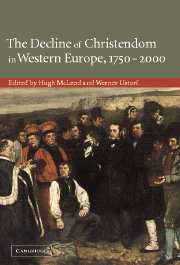Book contents
- Frontmatter
- Contents
- List of contributors
- Preface
- 1 Introduction
- Part I
- Part II
- 5 Established churches and the growth of religious pluralism: a case study of christianisation and secularisation in England since 1700
- 6 Catholicism in Ireland
- 7 Long-term religious developments in the Netherlands, c. 1750–2000
- 8 The potency of ‘Christendom’: the example of the Darmstädter Wort (1947)
- Part III
- Part IV
- Index of people and places
- Subject index
7 - Long-term religious developments in the Netherlands, c. 1750–2000
Published online by Cambridge University Press: 03 July 2009
- Frontmatter
- Contents
- List of contributors
- Preface
- 1 Introduction
- Part I
- Part II
- 5 Established churches and the growth of religious pluralism: a case study of christianisation and secularisation in England since 1700
- 6 Catholicism in Ireland
- 7 Long-term religious developments in the Netherlands, c. 1750–2000
- 8 The potency of ‘Christendom’: the example of the Darmstädter Wort (1947)
- Part III
- Part IV
- Index of people and places
- Subject index
Summary
At first sight the Netherlands could appear to offer a prime example of the inexorable decline of Christendom, defined as a tight conglomerate of civilisation, territory and ideology. As a political entity, the Dutch Republic arose in the wake of the Reformation. It duplicated the Reformation's shattering of the unity of western Christendom within its own polity. The Dutch Republic was notorious for the licence it accorded dissident religious groups. In 1599, Antoine L'Empereur, an archetypal Calvinist merchant who had been living in exile in various German cities since Parma's conquest of Antwerp, moved to Utrecht, in the heart of the Dutch Republic. He did not like what he saw. ‘Je voy par deca peu de discipline par la liberté trop grande, de maniere que rien ne nous advient que par un juste jugement de Dieu.’ His judgement was echoed by visitors and Reformed ministers throughout the seventeenth and eighteenth centuries.
A linear interpretation of Dutch religious history seems to present itself with considerable force. In the light of its origin as a mercantile, Protestant republic, born from a revolt against absolutism, its recent toleration of drugs, pornography, abortion and euthanasia as well as its staggering dechristianisation (more than half of the Dutch now declare themselves to belong to no church at all) causes no surprise.
The main argument of this chapter will rest upon a rejection of such a linear interpretation of the Dutch religious past.
- Type
- Chapter
- Information
- The Decline of Christendom in Western Europe, 1750–2000 , pp. 113 - 129Publisher: Cambridge University PressPrint publication year: 2003
- 11
- Cited by



